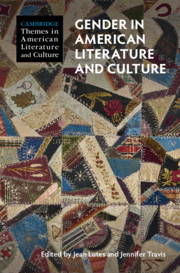Book contents
- Gender in American Literature and Culture
- Cambridge Themes in American Literature and Culture
- Gender in American Literature and Culture
- Copyright page
- Contents
- Contributors
- Acknowledgments
- Introduction
- Part I Intimacies
- Part II Aggressions
- Chapter 8 Sexual Violence and Indigenous Women
- Chapter 9 Intergenerational Memory and the Making of Indigenous Literary Kinships
- Chapter 10 US Women Writers, Sexual Violence, and Narrative Resistance
- Chapter 11 Gender, Violence, and Accountability in Contemporary Queer Latina Writing
- Chapter 12 The Literature of Racial Uplift and White Feminist Failure
- Chapter 13 Black Male Studies and Contemporary African American Writing
- Chapter 14 Representations of White Masculinity in Veteran-Authored Iraq War Fiction
- Part III New Directions
- Bibliography
- Index
Chapter 14 - Representations of White Masculinity in Veteran-Authored Iraq War Fiction
from Part II - Aggressions
Published online by Cambridge University Press: 01 April 2021
- Gender in American Literature and Culture
- Cambridge Themes in American Literature and Culture
- Gender in American Literature and Culture
- Copyright page
- Contents
- Contributors
- Acknowledgments
- Introduction
- Part I Intimacies
- Part II Aggressions
- Chapter 8 Sexual Violence and Indigenous Women
- Chapter 9 Intergenerational Memory and the Making of Indigenous Literary Kinships
- Chapter 10 US Women Writers, Sexual Violence, and Narrative Resistance
- Chapter 11 Gender, Violence, and Accountability in Contemporary Queer Latina Writing
- Chapter 12 The Literature of Racial Uplift and White Feminist Failure
- Chapter 13 Black Male Studies and Contemporary African American Writing
- Chapter 14 Representations of White Masculinity in Veteran-Authored Iraq War Fiction
- Part III New Directions
- Bibliography
- Index
Summary
Over the last decade, the Iraq War (2003-2011) has become a common subject in mainstream literary fiction. In this chapter, I analyze three key examples of veteran-authored novels: Nico Walker’s Cherry (2018), Michael Pitre’s Fives and Twenty-Fives (2014), and Kevin Powers’ The Yellow Birds (2012). I argue that it is important to read these novels not only as war literature but also as significant cultural representations of contemporary white masculinity. I show how, through their representations of the soldier as both a laboring white body and (as veteran) the traumatized bearer of witness to combat violence, these novels place their white, male protagonists in an exceptional space in which they are insulated from accountability. As such, they illustrate how trauma is used to shore up a particular version of white masculinity that is vulnerable in many ways but still claims a particular kind of authority and narrative control.
- Type
- Chapter
- Information
- Gender in American Literature and Culture , pp. 219 - 234Publisher: Cambridge University PressPrint publication year: 2021

